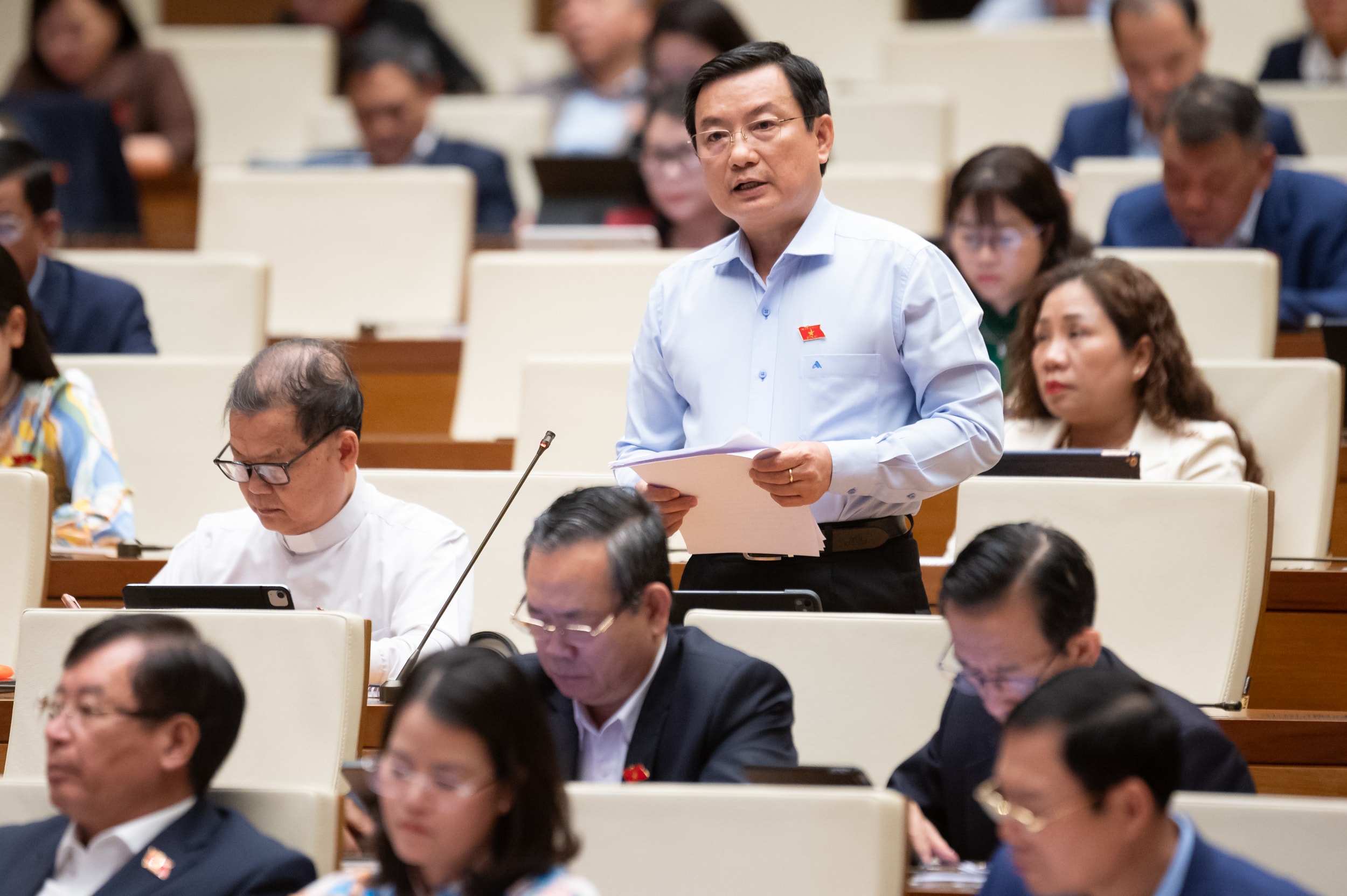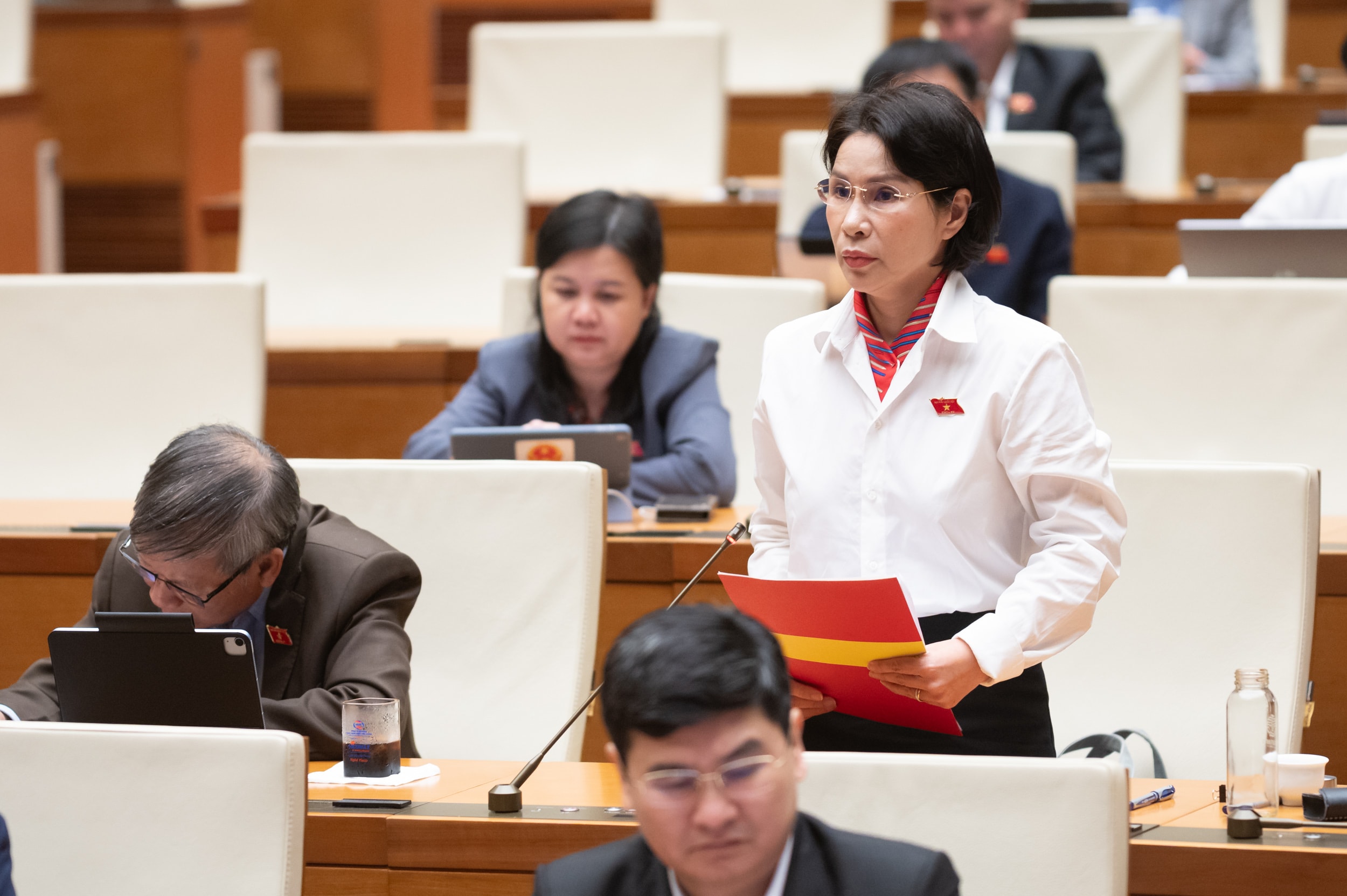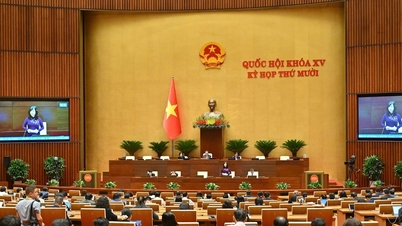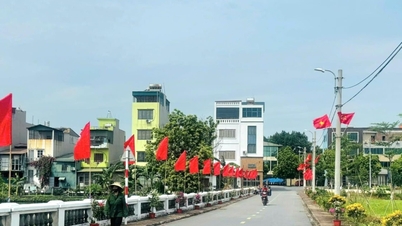A shield to protect people's health from the root
"If the Law on Disease Prevention is designed with a long-term vision, the draft Law on Disease Prevention is not a law on health , but a law on national immune capacity to protect the life and future of the race," National Assembly Deputy Pham Trong Nhan (Ho Chi Minh City) emphasized.
According to the delegate, the Law project is facing two choices: either it is just a framework law, rewriting the slogan, or it truly becomes an institutional shield to protect people's health from the root.

Clause 2, Article 15 of the draft Law states: “ The Government shall provide detailed regulations on the control of disease risk factors”. This provision is intended to create institutional space for the Government to flexibly make timely adjustments. However, delegate Pham Trong Nhan said that the above authorization provision is unclear in scope, has no time limit and is not binding.
The delegate said we are witnessing a generation of young people who are obese early, sick earlier and exhausted earlier, one of the causes of which comes from the daily consumption environment.
“It is not difficult to find unhealthy products and foods containing high levels of sugar, salt, saturated fat, or products containing industrial spices and flavorings that create a super delicious, irresistible feeling that can be found in snack packages, soft drinks, fast food, etc. These foods not only reprogram and distort taste habits, but long-term use also leads to addiction, constant cravings, and eventually obesity, diabetes, high blood pressure, and metabolic disorders,” the delegate frankly said.
Also from the above reality, "chronic diseases are increasing alarmingly among young people and adolescents, while the cost of treating non-communicable diseases currently accounts for 70% of the total national health burden. The golden population period is about to end, but the future of the young generation's illnesses is still hanging in the balance with institutional gaps that have not been boldly filled," the delegate expressed concern.
Delegate Pham Trong Nhan emphasized that the law does not prohibit culinary pleasures but must guide consumption and protect a safe living environment, where commercial profits cannot be placed above the health of the community.
Legislation in the direction of framework laws and pipeline laws may be necessary to ensure stability, but in the field of public health, where each grain of sugar and each drop of flavoring seems small, but its resonance effect becomes a wave of taste that sweeps away the health of an entire generation, the scope of authorization in Clause 2, Article 15 needs to be limited in the law.
Delegate Pham Trong Nhan pointed out that the world has long since moved to a health mindset in all policies, where each strategic decision must be assessed for its impact on community health. Therefore, the Law on Disease Prevention cannot be just a specialized law of the Ministry of Health, but must be a framework law for the entire national development policy.
To control disease risk factors, we should not stop at declarations. Delegates suggested considering amending Clause 2, Article 15 in the direction of clearly binding responsibilities and implementation deadlines.
Accordingly, the Government is responsible for promulgating and periodically updating the list of products and risk factors that are harmful to health, prescribing management measures including warning labels, advertising restrictions, controlling distribution in educational institutions and applying appropriate health tax policies. Within 12 months from the effective date of the law, the Government, the Ministry of Health and relevant ministries must complete detailed regulations beyond the temporary application period according to the criteria announced by the Ministry of Health.
At the same time, ban marketing aimed at children under 16 years old on all platforms, clearly define safe areas for school nutrition, and ban the sale and advertising of products with warning labels within schools according to the recommendations of the World Health Organization and in accordance with Vietnam's practices.
Establish health taxes based on sugar and fat thresholds, encourage businesses to innovate products, and simultaneously reduce taxes on natural, low-additive products so that fiscal policy is aligned with health policy.
Delegate Pham Trong Nhan suggested that it is time to expand the institutional perspective not only to pave the way for economic development but also to guide the health, physical condition and products of the race, because growth cannot be considered development if the physical condition of the race is being eroded day by day by an unsafe consumption environment. The Law on Disease Prevention must be strong enough to stay ahead of disease. This is a commitment of the National Assembly to the future of the Vietnamese race.
Encourage production and consumption of healthy products
National Assembly Deputy Tran Thi Nhi Ha (Hanoi) also said that our country's legal system has regulations on preventing and combating the harmful effects of tobacco, alcohol, beer, and products that have a direct impact on consumers' health. However, there is still a lack of a comprehensive control mechanism for product groups that increase non-communicable diseases such as products containing a lot of sugar, a lot of salt, fast food, and ultra-processed products.

The delegate stated that to effectively prevent diseases, our country not only needs some tax solutions as in the past, but it is important to establish a comprehensive, synchronous and sustainable policy, aiming to change the structure of the food industry, while transforming social awareness about healthy consumption.
“We cannot continue to “put out fires” with treatment when preventable non-communicable disease agents are not yet well controlled. The Law on Disease Prevention needs to be stronger, more decisive and one step ahead to protect people’s health in this aspect,” the delegate emphasized.
At the same time, delegates proposed that it is necessary to establish a sustainable financial mechanism for disease prevention activities, meeting the requirements of fundamental innovation in the spirit of Resolution 72-NQ/TW of the Politburo.
Delegate Tran Thi Nhi Ha proposed adding two more contents to Article 3. Specifically, adding Clause 5a , "The State has a policy to encourage the production and consumption of healthy products, while controlling and restricting products that are not beneficial to health according to the provisions of law". Adding Clause 10a , "The State has a sustainable financial policy for disease prevention activities, including the state budget, health insurance fund, tax policy and socialized sources".
Source: https://daibieunhandan.vn/luat-phong-benh-phai-du-manh-de-di-truoc-benh-tat-10395132.html



![[Photo] Prime Minister Pham Minh Chinh attends the annual Vietnam Business Forum](https://vphoto.vietnam.vn/thumb/1200x675/vietnam/resource/IMAGE/2025/11/10/1762780307172_dsc-1710-jpg.webp)

![[Photo] Prime Minister Pham Minh Chinh attends the Patriotic Emulation Congress of the Ministry of Foreign Affairs for the 2025-2030 period](https://vphoto.vietnam.vn/thumb/1200x675/vietnam/resource/IMAGE/2025/11/10/1762762603245_dsc-1428-jpg.webp)





























































































![Dong Nai OCOP transition: [Article 3] Linking tourism with OCOP product consumption](https://vphoto.vietnam.vn/thumb/402x226/vietnam/resource/IMAGE/2025/11/10/1762739199309_1324-2740-7_n-162543_981.jpeg)











Comment (0)